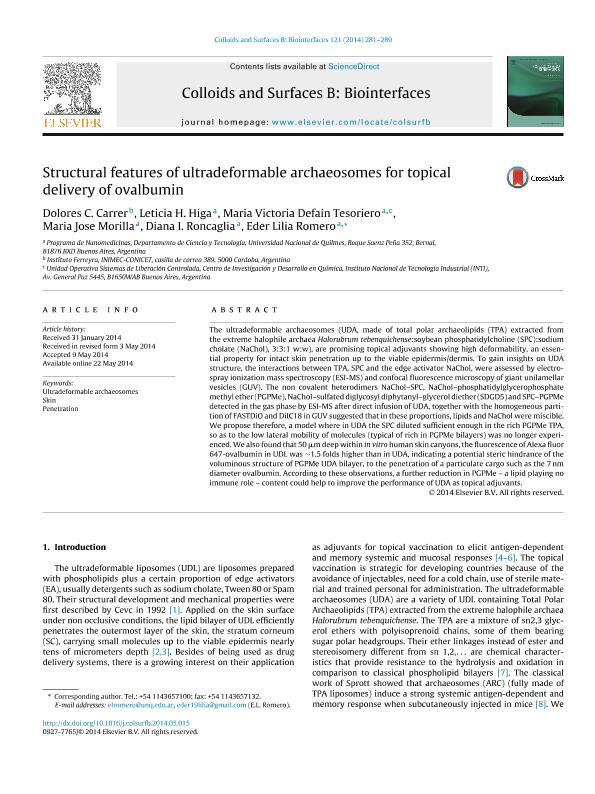Mostrar el registro sencillo del ítem
dc.contributor.author
Carrer, Dolores Catalina

dc.contributor.author
Higa, Leticia Herminia

dc.contributor.author
Defain Tesoriero, Maria Victoria
dc.contributor.author
Morilla, María José

dc.contributor.author
Roncaglia, Diana Inés

dc.contributor.author
Romero, Eder Lilia

dc.date.available
2017-12-27T15:06:05Z
dc.date.issued
2014-05
dc.identifier.citation
Romero, Eder Lilia; Roncaglia, Diana Inés; Morilla, María José; Defain Tesoriero, Maria Victoria; Higa, Leticia Herminia; Carrer, Dolores Catalina; et al.; Structural features of ultradeformable archaeosomes for topical delivery of ovalbumin; Elsevier Science; Colloids and Surfaces B: Biointerfaces; 121; 5-2014; 281-289
dc.identifier.issn
0927-7765
dc.identifier.uri
http://hdl.handle.net/11336/31637
dc.description.abstract
The ultradeformable archaeosomes (UDA, made of total polar archaeolipids (TPA) extracted from the extreme halophile archaea Halorubrum tebenquichense:soybean phosphatidylcholine (SPC):sodium cholate (NaChol), 3:3:1 w:w), are promising topical adjuvants showing high deformability, an essential property for intact skin penetration up to the viable epidermis/dermis. To gain insights on UDA structure, the interactions between TPA, SPC and the edge activator NaChol, were assessed by electrospray ionization mass spectroscopy (ESI-MS) and confocal fluorescence microscopy of giant unilamellar vesicles (GUV). The non covalent heterodimers NaChol–SPC, NaChol–phosphatidylglycerophosphate methyl ether (PGPMe), NaChol–sulfated diglycosyl diphytanyl–glycerol diether (SDGD5) and SPC–PGPMe detected in the gas phase by ESI-MS after direct infusion of UDA, together with the homogeneous partition of FASTDiO and DiIC18 in GUV suggested that in these proportions, lipids and NaChol were miscible. We propose therefore, a model where in UDA the SPC diluted sufficient enough in the rich PGPMe TPA, so as to the low lateral mobility of molecules (typical of rich in PGPMe bilayers) was no longer experienced. We also found that 50 μm deep within in vitro human skin canyons, the fluorescence of Alexa fluor 647-ovalbumin in UDL was ∼1.5 folds higher than in UDA, indicating a potential steric hindrance of the voluminous structure of PGPMe UDA bilayer, to the penetration of a particulate cargo such as the 7 nm diameter ovalbumin. According to these observations, a further reduction in PGPMe – a lipid playing no immune role – content could help to improve the performance of UDA as topical adjuvants.
dc.format
application/pdf
dc.language.iso
eng
dc.publisher
Elsevier Science

dc.rights
info:eu-repo/semantics/openAccess
dc.rights.uri
https://creativecommons.org/licenses/by-nc-sa/2.5/ar/
dc.subject
Penetration
dc.subject
Skin
dc.subject
Ultradeformable Archaeosomes
dc.subject.classification
Nano-materiales

dc.subject.classification
Nanotecnología

dc.subject.classification
INGENIERÍAS Y TECNOLOGÍAS

dc.title
Structural features of ultradeformable archaeosomes for topical delivery of ovalbumin
dc.type
info:eu-repo/semantics/article
dc.type
info:ar-repo/semantics/artículo
dc.type
info:eu-repo/semantics/publishedVersion
dc.date.updated
2017-12-26T20:38:05Z
dc.journal.volume
121
dc.journal.pagination
281-289
dc.journal.pais
Países Bajos

dc.journal.ciudad
Amsterdam
dc.description.fil
Fil: Carrer, Dolores Catalina. Consejo Nacional de Investigaciones Científicas y Técnicas. Centro Científico Tecnológico Conicet - Córdoba. Instituto de Investigación Médica Mercedes y Martín Ferreyra. Universidad Nacional de Córdoba. Instituto de Investigación Médica Mercedes y Martín Ferreyra; Argentina
dc.description.fil
Fil: Higa, Leticia Herminia. Consejo Nacional de Investigaciones Científicas y Técnicas; Argentina. Universidad Nacional de Quilmes. Departamento de Ciencia y Tecnología; Argentina
dc.description.fil
Fil: Defain Tesoriero, Maria Victoria. Universidad Nacional de Quilmes. Departamento de Ciencia y Tecnología; Argentina. Instituto Nacional de Tecnología Industrial; Argentina
dc.description.fil
Fil: Morilla, María José. Consejo Nacional de Investigaciones Científicas y Técnicas; Argentina. Universidad Nacional de Quilmes. Departamento de Ciencia y Tecnología; Argentina
dc.description.fil
Fil: Roncaglia, Diana Inés. Universidad Nacional de Quilmes. Departamento de Ciencia y Tecnología; Argentina
dc.description.fil
Fil: Romero, Eder Lilia. Universidad Nacional de Quilmes. Departamento de Ciencia y Tecnología; Argentina. Consejo Nacional de Investigaciones Científicas y Técnicas; Argentina
dc.journal.title
Colloids and Surfaces B: Biointerfaces

dc.relation.alternativeid
info:eu-repo/semantics/altIdentifier/doi/http://dx.doi.org/10.1016/j.colsurfb.2014.05.015
dc.relation.alternativeid
info:eu-repo/semantics/altIdentifier/url/http://www.sciencedirect.com/science/article/pii/S0927776514002501
Archivos asociados
